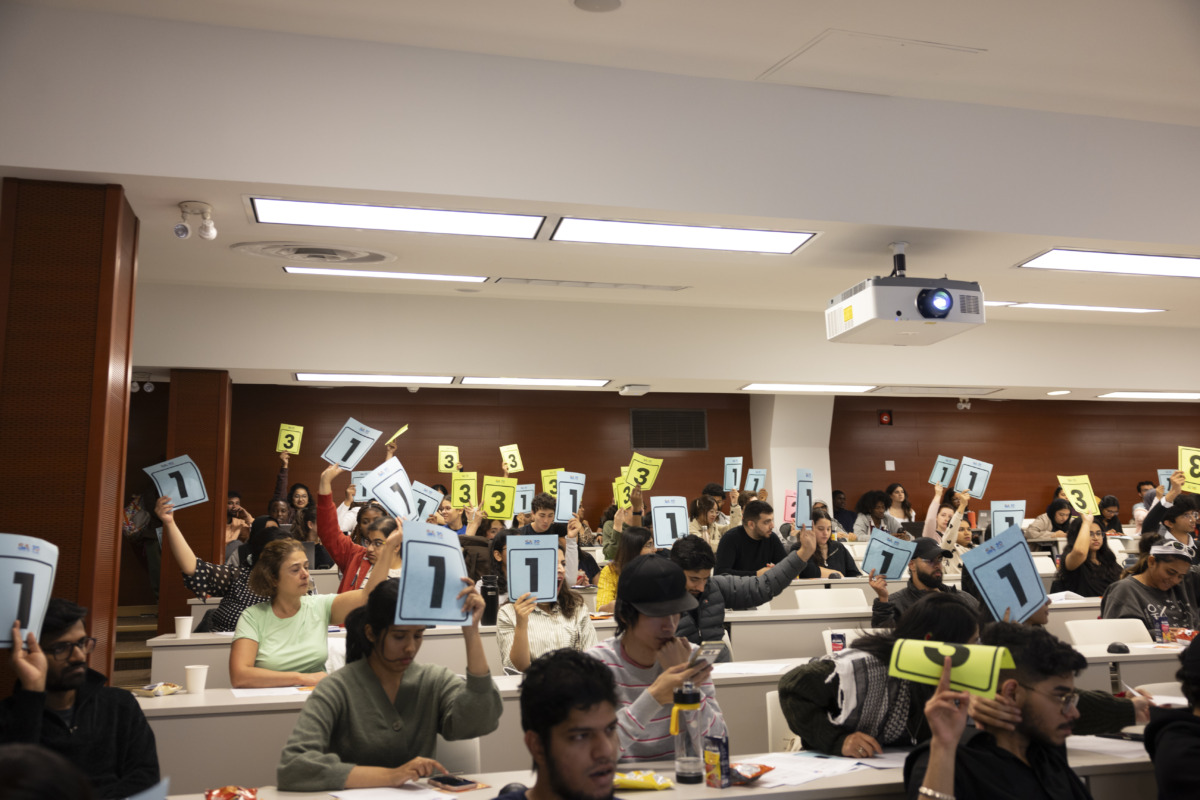Town hall to be held in new year so changes to election requirements can be discussed by students.
The Annual General Meeting (AGM) held on Oct 30 at St James campus saw a series of unexpected twists and turns.
An important agenda item brought forth by “concerned students” to amend a bylaw could not be voted upon due to lack of time. Students found out about the suspension of three directors followed by a call to protest by the student strike for Palestine.
During the approval of the agenda, a student brought attention to the suspension of the directors. The topic was not discussed due to its internal investigative process and a separate Board Mediation Committee (BMC) handling the issue.
Throughout the meeting students persistently questioned the reason behind the suspension. The chair Kayla Weiler had to repeatedly call order to the meeting urging the quorum to continue discourse on the agenda items that still needed to be discussed.
Grant Thornton LLP presented the financial statements for the SA. SA had more than $23.9-milion in net assets and $5.3-million in liabilities for the year ended May 31. The total revenue generated was more than $20.7-million with $19,008,107 in expenses.
The total revenue saw an increase mainly due to higher student enrollment.
Expenses also increased from 2023 mainly due to higher health insurance premiums and wages from hiring more part time employees and equity support programs (Presto loads). The financial statements and the motion to appoint Grant Thornton LLP as auditors for the next fiscal year were accepted after a vote.
Peter Corno, director of student experience presented the program annual report highlighting SA’s achievements in donations, equity care, relief funds. These included the program reports for services like Student Nutrition Access Program (SNAP), and Community Care Centre (CCC), alongside scholarships and bursaries, legal services and more.
Damian Casas, a student, raised concerns about the availability of pregnancy tests and asked what was being done to address that. Ronnie Cruz the equity and advocacy manager shared “we work with Toronto Public Health, we are still in the process of getting that supply, but I am going to work with them to ensure we have sufficient supplies.”
Then came time to deliberate and vote on the motion to amend the bylaw. This motion was put forward, supported and signed by 22 students. This included removal of certain eligibility requirements, term limits, and course load restrictions for the executive positions.
Many students spoke against the motion stating the need for the requirements to maintain standards and ensure that the elected are capable and responsible. They expressed concerns that removing the requirements could compromise the organization’s ability to effectively manage its finances and resources.
On the other hand, those in favor of the motion argued that the requirement was more likely to pose stringent restrictions that exclude qualified candidates. They emphasized the importance of diversity and inclusivity within the organization. They believe that the proposed changes will allow a wider range of students, especially international students, to participate in leadership roles.
Barichisu Osman Abugbila, community services and early child educational centre representative spoke in favor of the motion. She stressed the complex intricacies of the SA and the time it takes to understand the roles and responsibilities of executive positions.
“It will take you more than one year to understand how the SA operates. And before you can contribute you will probably be looking for a second term.”
This was echoed by Simran Kaur, hospitality and culinary arts educational centre representative,
“It will take at least six months to understand how the SA is working… 3.0 grade point average does not define how logical or how critical your mind thinks.”
A bylaw amendment requires at least two thirds majority vote to pass, however the AGM could not proceed to a vote due to lack of time.
The meeting adjourned at 2 p.m. and the chair informed the students that this motion and the outstanding item would be carried on to the subsequent meeting. This left a few students disappointed with the time limitations.
It should be noted that students and board members for the past 29 years have not had concerns regarding the requirements in question. It is only now during a time when there are serious issues being raised regarding sitting board members, the legality of their actions, and where their priorities stand, that students are allegedly concerned enough to bring this to a vote.


